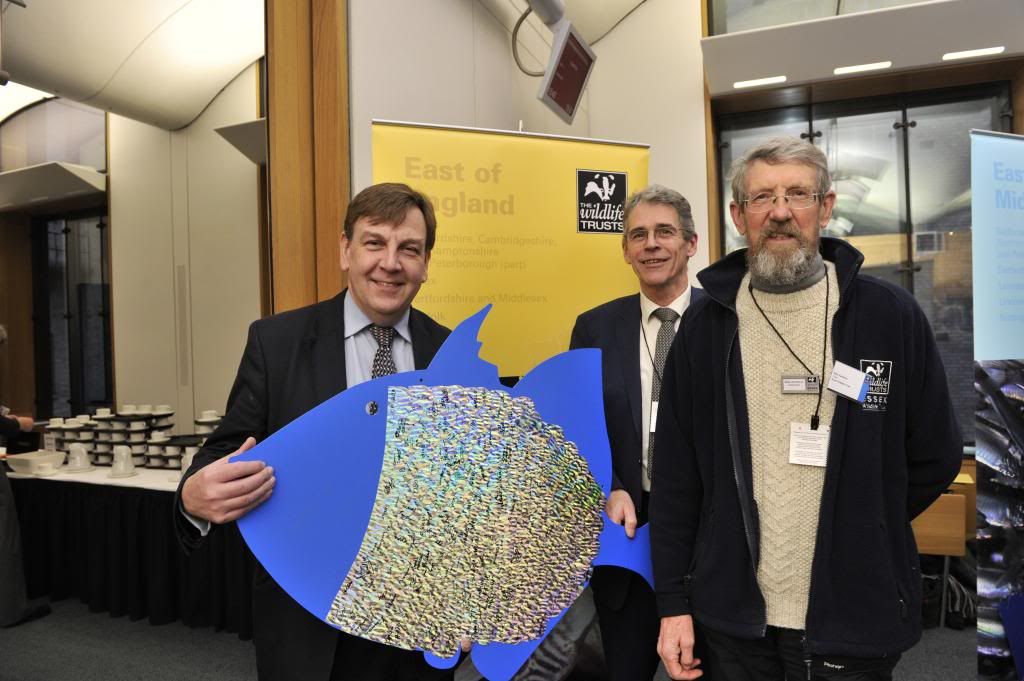On Tuesday (22nd January), John Whittingdale MP joined members of the Essex Wildlife Trust in Parliament to press the Government to designate the Blackwater Estuary as a Marine Conservation Zone.
The proposed Zone will cover the Roach, Crouch, Blackwater and Colne estuaries John is pictured with John Hall, Chief Executive of the Essex Wildlife Trust, and Mike Sandison, Chairman of the Trust, who lives in the Maldon District in Maylandsea. John Whittingdale’s comments come as The Wildlife Trusts held a parliamentary event to show support for the proposed network of Marine Conservation Zones in English and offshore Welsh waters, as the Government consults on which areas should be designated. The event brought to a close The Wildlife Trusts’ ‘Petition Fish’ campaign, which secured almost 250,000 signatures in support of marine protection, 14,000 of which were collected in Essex.

Petition Fish was part of The Wildlife Trusts’ campaign to secure an ‘ecologically coherent’ network of Marine Protected Areas around the UK. This would allow our seas to recover from past damage and sustain current pressures.
John Whittingdale said; “I was delighted to join The Wildlife Trusts to show my support for the recommended Marine Conservation Zone network and to press the Government to include the Blackwater MCZ as one of the first designated zones. The estuary is of huge importance environmentally and it will benefit greatly from the protection that designation will bring. In particular, it will help protect the Native Oyster beds which are the UK’s rarest marine habitat. I congratulate the Essex Wildlife Trust on the work that they have done to draw up a management plan in cooperation with all those who use the estuary including the oyster fishermen and I hope that the Government will now proceed with its designation”.
Joan Edwards, Head of Living Seas for The Wildlife Trusts, said, “The recommended network of Marine Conservation Zones was chosen following an extensive process involving sea users from fishermen and the aggregates industry to divers and boat-users. The proposals represent a significant step forward towards an ecologically coherent network of Marine Protected Areas.” The consultation runs until 31st March. People can respond through The Wildlife Trusts’ website wildlifetrusts.org/haveyoursay
The Wildlife Trusts (TWT) wildlifetrusts.org There are 47 individual Wildlife Trusts covering the whole of the UK. All are working for an environment rich in wildlife for everyone. We have more than 800,000 members including 150,000 members of our junior branch Wildlife Watch. Our vision is to create A Living Landscape and secure Living Seas. We manage around 2,300 nature reserves and every year we advise thousands of landowners and organisations on how to manage their land for wildlife. We also run marine conservation projects around the UK, collecting vital data on the state of our seas and celebrating our amazing marine wildlife. Every year we work with thousands of schools and our nature reserves and visitor centres receive millions of visitors. Each Wildlife Trust is working within its local communities to inspire people about the future of their area: their own Living Landscapes and Living Seas. Petition Fish The petition was signed by 249,859 people calling for greater marine protection in UK waters. Supporters signed silver scales and stuck them onto fish, sea horses and other marine shapes – see attached image. We can supply other images of people signing scales or with the eye-catching boards on beaches all over the country. Marine Conservation Zones 127 recommended Marine Conservation Zones were chosen after two years’ work by more than one million stakeholders from all sectors of the marine environment and at a cost of over £8.8 million to Government. You can visit all these zones on our interactive map and see some of the wonders they are home to at www.wildlifetrusts.org/MCZmap . The network was designed to ensure that special marine landscapes do not become isolated and vulnerable, and to ensure that the wide range of marine habitats found in UK seas are protected. Failure to designate all but a very small proportion of sites recommended by these stakeholders would mean that we lack the ecologically coherent network that our seas so badly need to recover. In December 2012, Defra launched its public consultation and proposed to designate only 31 of the 127 sites recommended by a broad range of sea-users through its regional projects.


